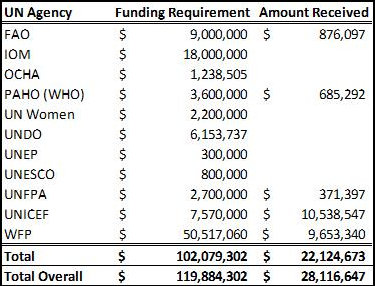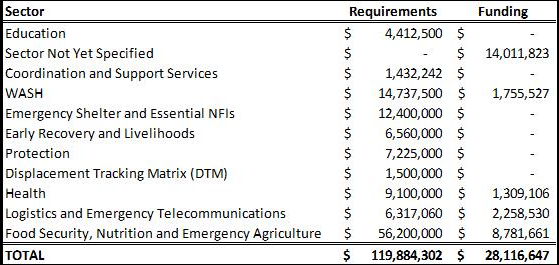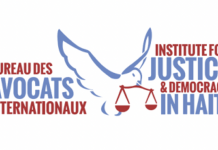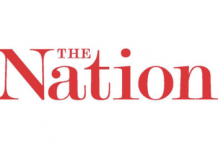by Jake
Johnston
Johnston
On Oct. 10,
less than a week after Hurricane Matthew ripped across Haiti, the United
Nations launched an emergency appeal for $120 million. As of this report on
Oct. 24, donors have failed to fill the need, contributing just over 20% of the
funds deemed necessary. But whom is the money being raised for? What planning
or coordination went in to the $120 million ask? Are donors right to be
hesitant?
less than a week after Hurricane Matthew ripped across Haiti, the United
Nations launched an emergency appeal for $120 million. As of this report on
Oct. 24, donors have failed to fill the need, contributing just over 20% of the
funds deemed necessary. But whom is the money being raised for? What planning
or coordination went in to the $120 million ask? Are donors right to be
hesitant?
An analysis of UN Financial Tracking Service data shows that the
vast majority of the funds raised are destined for UN agencies or large,
international NGOs. Reading press releases, government statements, and comments
to the press, it would seem that many lessons have been learned after the
devastating earthquake of 2010: the importance of coordinating with the
government, of working with local institutions and organizations, of purchasing
goods locally, and of building long-term sustainability in to an emergency
response.
vast majority of the funds raised are destined for UN agencies or large,
international NGOs. Reading press releases, government statements, and comments
to the press, it would seem that many lessons have been learned after the
devastating earthquake of 2010: the importance of coordinating with the
government, of working with local institutions and organizations, of purchasing
goods locally, and of building long-term sustainability in to an emergency
response.
But, as one Haitian government
official posed it to me, “we all learned the lessons, but have we found a
solution?” Based on the UN Office for the Coordination of Humanitarian Affairs
(OCHA) appeal, the answer is: not yet.
official posed it to me, “we all learned the lessons, but have we found a
solution?” Based on the UN Office for the Coordination of Humanitarian Affairs
(OCHA) appeal, the answer is: not yet.
Perhaps this should be of little
surprise, the flash appeal is designed specifically to “fund United Nations aid
activities” for the next three months, not to raise money for local
organizations, the Haitian government, or for long-term, sustainable
projects. But the analysis is
nonetheless revealing.
surprise, the flash appeal is designed specifically to “fund United Nations aid
activities” for the next three months, not to raise money for local
organizations, the Haitian government, or for long-term, sustainable
projects. But the analysis is
nonetheless revealing.
Funding Destined for UN and Foreign NGOs
The appeal is
largely based on individual projects from individual organizations and does not
appear to have been launched with input from the Haitian government. As can be
seen below, the vast majority of funding is destined for UN agencies.
largely based on individual projects from individual organizations and does not
appear to have been launched with input from the Haitian government. As can be
seen below, the vast majority of funding is destined for UN agencies.
Table 1.
Looking at the
above chart, one sees that 85% of the funding requested is for the UN’s own
agencies and that, of the $28 million provided so far, 79% has gone to these
same entities.
above chart, one sees that 85% of the funding requested is for the UN’s own
agencies and that, of the $28 million provided so far, 79% has gone to these
same entities.
Of the remaining $17 million for
other organizations, it is overwhelmingly allocated to large foreign NGOs such
as CARE and Save the Children. Haitian organizations or institutions appear to
have an extremely limited role in the appeal, if one at all.
other organizations, it is overwhelmingly allocated to large foreign NGOs such
as CARE and Save the Children. Haitian organizations or institutions appear to
have an extremely limited role in the appeal, if one at all.
Importance of Coordination and Long-Term
Sustainability
Sustainability
There has also
been an acknowledgment that more must be done to both coordinate with the
Haitian government and the various actors on the ground and to focus earlier on
in building long-term capacity. But the OCHA appeal does not have an emphasis
on either.
been an acknowledgment that more must be done to both coordinate with the
Haitian government and the various actors on the ground and to focus earlier on
in building long-term capacity. But the OCHA appeal does not have an emphasis
on either.
As can be seen,
about 50% of the total requirement is for the food security, nutrition, and
emergency agriculture sector. There is no doubt that agriculture production and
food security are some of the largest concerns going forward, but most of these
funds, $46 million, is for short-term food assistance through the World Food
Program (WFP). On the other hand, just $9 million will go towards “restoration”
of “rural productive capacity.” The WFP program has already received $7.4
million, while the restoration project has only received $800,000.
about 50% of the total requirement is for the food security, nutrition, and
emergency agriculture sector. There is no doubt that agriculture production and
food security are some of the largest concerns going forward, but most of these
funds, $46 million, is for short-term food assistance through the World Food
Program (WFP). On the other hand, just $9 million will go towards “restoration”
of “rural productive capacity.” The WFP program has already received $7.4
million, while the restoration project has only received $800,000.
Again, this is not to say that
emergency food assistance is not needed, but it must be a part of longer-term
sustainable projects to rebuild agriculture capacity as well. The OCHA appeal,
while focusing on emergency needs, could also raise funds for needed capacity
building. Funds from donors and private individuals come mostly after a
disaster, but if all the money raised simply goes to emergency needs, there is
nothing left to build for the long term when donor funds will be even scarcer.
emergency food assistance is not needed, but it must be a part of longer-term
sustainable projects to rebuild agriculture capacity as well. The OCHA appeal,
while focusing on emergency needs, could also raise funds for needed capacity
building. Funds from donors and private individuals come mostly after a
disaster, but if all the money raised simply goes to emergency needs, there is
nothing left to build for the long term when donor funds will be even scarcer.
Coordination and support services,
on the other hand, is only the target of 1.2% of the overall appeal. However,
this appears to be one of the most significant bottle necks in the distribution
of assistance right now in Haiti. The Haitian government has pledged to take
the lead in coordinating the international and local response, but lacks the
necessary capacity – or willingness from donors – to make that a reality. The
OCHA appeal does attempt to raise funds to support the government’s
coordination efforts, but only $193,000, and that would go through the UN
Development Program. That project remains 0 percent funded as of now. In fact,
despite the low targets for the sector, no funding has thus been channeled in
to this important area.
on the other hand, is only the target of 1.2% of the overall appeal. However,
this appears to be one of the most significant bottle necks in the distribution
of assistance right now in Haiti. The Haitian government has pledged to take
the lead in coordinating the international and local response, but lacks the
necessary capacity – or willingness from donors – to make that a reality. The
OCHA appeal does attempt to raise funds to support the government’s
coordination efforts, but only $193,000, and that would go through the UN
Development Program. That project remains 0 percent funded as of now. In fact,
despite the low targets for the sector, no funding has thus been channeled in
to this important area.
On his visit to Haiti last week, UN
Secretary General Ban Ki-moon expressed
“disappointment” with donors, who had yet to commit funds. “I know there is
some fatigue from certain countries, but the current situation, the current
disaster that hit this country through Hurricane Matthew is beyond
description,” he said.
Secretary General Ban Ki-moon expressed
“disappointment” with donors, who had yet to commit funds. “I know there is
some fatigue from certain countries, but the current situation, the current
disaster that hit this country through Hurricane Matthew is beyond
description,” he said.
“The United Nations stands by your
side. We will mobilize all resources to help you,” Ban continued. Speaking on
Oct. 23 directly to donor governments, Ban once again criticized the slow
response, saying “We urgently need more resources.”
side. We will mobilize all resources to help you,” Ban continued. Speaking on
Oct. 23 directly to donor governments, Ban once again criticized the slow
response, saying “We urgently need more resources.”
Provisional president of Haiti
Jocelerme Privert struck a slightly different tone in his remarks with Ban in
mid-October: “There will always be hurricanes, there will always be
catastrophes. We need concrete actions to mitigate the damage from the next
hurricanes that have not hit yet,” he said.
Jocelerme Privert struck a slightly different tone in his remarks with Ban in
mid-October: “There will always be hurricanes, there will always be
catastrophes. We need concrete actions to mitigate the damage from the next
hurricanes that have not hit yet,” he said.
Those are the types of actions that
failed to materialize after the 2010 earthquake and that do not appear to be addressed
through this latest UN appeal for funds.
Everyone learned the lessons, but Haiti still needs solutions.
failed to materialize after the 2010 earthquake and that do not appear to be addressed
through this latest UN appeal for funds.
Everyone learned the lessons, but Haiti still needs solutions.
*Flash Appeal funding data is as of Oct. 21, 2016.
An earlier version of this article was originally published on the Haiti: Relief and
Reconstruction Watch blog of the Center for Economic and Policy Research.
Reconstruction Watch blog of the Center for Economic and Policy Research.







